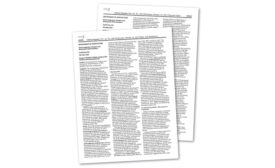Commentary | Fight for Food Safety
Home » regulations
Articles Tagged with ''regulations''
Commentary | Poultry Perspectives
Regulatory implications associated with an administration change
Read MoreCordray's Corner | Dr. Joe Cordray
Things that make a small meat processing plant successful
Read MoreRegulations & Legislation
FSIS moves on label claim sampling program, partially hydrogenated oils
Read MoreStay ahead of the curve. Unlock a dose of cutting-edge insights.
Receive our premium content directly to your inbox.
SIGN-UP TODAYCopyright ©2024. All Rights Reserved BNP Media.
Design, CMS, Hosting & Web Development :: ePublishing










